Loft Mountain Campground — Shenandoah National Park
Four Day Trip
Spent four nights at this campground! No hook up but great spot to explore Shenandoah National Park
The Shenandoah Valley surrounding Flint Hill, Virginia provides multiple camping options within Shenandoah National Park and nearby public lands. Established campgrounds like Andy Guest/Shenandoah River State Park and Mathews Arm offer developed sites for tent camping, RVs, and cabin rentals, while dispersed backcountry camping is available throughout the national park with proper permits. The region includes both riverside locations with water access and mountain settings with scenic overlooks along Skyline Drive, providing diverse terrain and camping experiences within a 30-mile radius of Flint Hill.
Backcountry permits are required for dispersed camping in Shenandoah National Park, and many developed campgrounds operate seasonally, with most sites open from May through October or November. Weather conditions vary significantly with elevation changes. "We experienced everything from warm summer-like weather to chilly winter winds during our 6 days in the backcountry," noted one camper who visited in April. Mountain weather can change rapidly, particularly at higher elevations along Skyline Drive, where temperatures remain cooler than surrounding valleys. Cell service is limited or non-existent in many areas, particularly in backcountry locations, and visitors should prepare for potential wildlife encounters including black bears, necessitating proper food storage.
Campers consistently mention the dramatic views and wildlife viewing opportunities as highlights of camping in this region. Several developed campgrounds near Flint Hill provide amenities like drinking water, toilets, and picnic tables, while offering varying levels of privacy between sites. A visitor to Mathews Arm Campground noted that "the sites are relatively close together" but praised the "fun day hikes all around." Backcountry sites offer more solitude but require additional preparation. Creek access is frequently mentioned in reviews of dispersed sites, though seasonal water flows can vary dramatically, with spring bringing high water levels at creek crossings. The region's proximity to the Appalachian Trail makes it popular with through-hikers, who often share space at established huts and shelters along the trail during peak hiking seasons.
$30 - $40 / night
"Virginia has the best state park campgrounds. Water and electric. Large sites. The bathrooms are clean with separate shower rooms. Nice hiking in the park. Near SNP. Responsive and friendly rangers."
"In my opinion it has the best location of the 3 Turks they have. It’s it the woods close to a boat landing you can see a bit of the river. In the fall or spring I’m sure the view is amazing."
$30 - $75 / night
"This is a nice and very large campground tucked away in the northern part of Shenandoah. The facilities and grounds were well kept and it’s a short car’s travel (but there’s also a trail!)"
"There are a few trails encompassing and leading out from the campground, and it's nice to have a central location from which you can out on small hikes."
$30 - $75 / night
"While the campground is very nice, with clean conveniently located bathrooms, the site itself is probably not suited for a large group of people."
"Our site had the AT running right behind it. The was plenty of access to trails, and pretty central to the park. The campground is near showers, laundry, campstore, and visitor center."
"It is suitable for novice campers to experienced off-trail campers. You'll never tire of the wonders this beautiful piece of America has to offer."
"There was definitely a lot less privacy/space between sites here at SNP than I’ve noted at other parks across Virginia."
"We are tent campers and we’re looking for a place close to Shenandoah to ride our motorcycles. This was 3 miles from the north entrance to the park, perfect."
"Hike up a trail or up through the creek itself to a swimming hole only accessible to campers. Saw some decent sized fish swimming around in there."
"Close to Shenandoah National Park and Skyline Drive."
"They had plenty of appearances of Yogi or Cindy bear at activities and just driving around the park on a golf cart."
$34 - $220 / night
"Adjacent to a working farm where cows, sheep, llamas, chickens and roosters can graze next to the campsites. The grounds were beautifully manicured and incredibly clean."
"We stayed at this KOA on our way to Virginia Beach but wanted to a day in Shenandoah National Park. "
$30 - $125 / night
"Positive: Friendly staff, near the river, close to Shenandoah NP, quiet camping, every site has a fire pit. Negative: sanitary fascilities are old."
"Sites 31 and 32 (despite being near the campground’s public river access) look large and private. Both riverside."
$20 / night
"In the valley outside of Shenandoah, it was a nice spot to return to at night. There are also some hiking trails across the street."
"Campground Review: What a great find, so close to a town….though feels like you are deep in the forest!"
"Parking is in a locked lot steps away from trail head which leads to campsites about a mile away. Campsites are in a wooded area of park well away from other park attractions so it's very quiet."
"When we were there they were having a historical reenactment near the visitors center that was so cool! We came in August and it was super hot, but that is just Virginia."
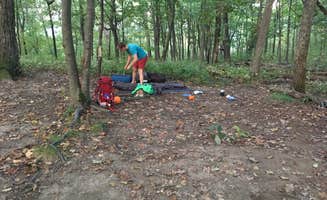
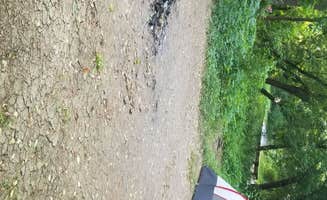
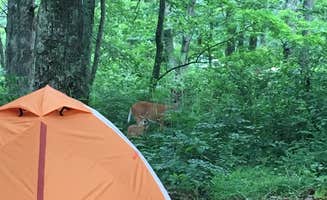
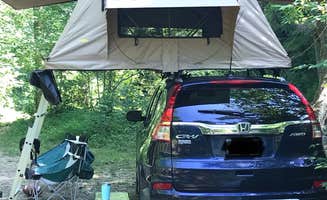
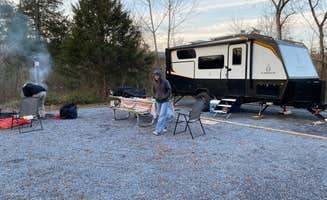
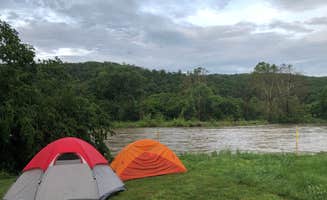
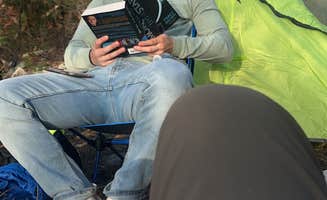
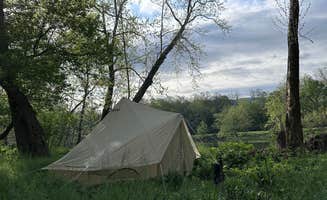
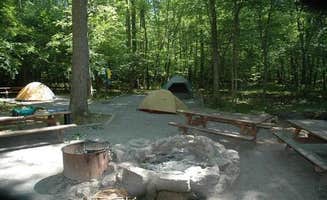
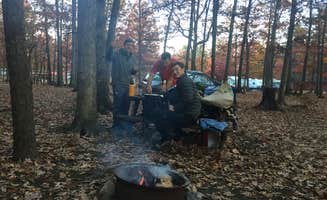
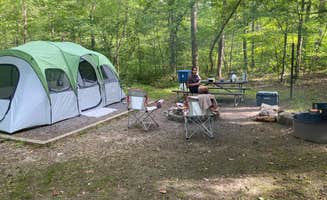
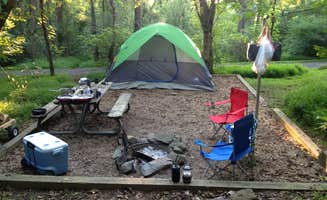
Spent four nights at this campground! No hook up but great spot to explore Shenandoah National Park
This is our third year coming in the winter. We always come for a long weekend. Got snowed in this year but owner cleared driveway and made sure we could get out on time. Bathroom was open and showers worked.
The Shenandoah Mountains are beautiful any time of year, but early fall is spectacular. Ripe blackberries underlie the whole landscape everywhere you go, trees are turning magnificent colors, songbirds are stopping over on their migration south, bugs are nearly non-existent. I enjoyed visiting the park and camping here, especially as it is one or the few National Parks that are dog-friendly and allow dogs most everywhere, --throughout campground, on most trails, and even on the outside deck at cafe by our campground. The park also participates in the "Bark Ranger" program for dogs.
This campground is one of three main campgrounds in the park, and has a Campground store as well as nearby cafe featuring variety of sandwiches, soups and desserts, including local blackberry ice cream! So you will be well-provided for. There is a maze of trails around the campground itself, and just down the Skyline Parkway is access to the Big Run trail network, which provides great birding, hiking, and fishing
Even in the campground among many campers, there is great access to the Dark sky which is great for stargazing. Ranger programs in the campground feature this and other nature programs. From the campground there is easy access to myriad scenic overlooks along Skyline Drive in both directions. There is a fairly long drive to get to the north end of the park at Big Meadows which is the northernmost campground and where the NPS Visitor center is. The scenic drive but you do have to double back a long way to get back to Loft campground.
Make reservations well ahead of time! Most sites need to be reserved, a few available for same day. Campground fills up early in the day. Tent campers are more likely to get a spot. We got the last site of the day. It had a good drive in for a couple cars, but the tent pad was pretty small. There was a picnic table and fire ring, but the campsite itself was a little overgrown and in need of maintenance. The bathrooms were in need of some cleaning too; usually the National Park Service is good about this, but the park was short staffed and so things were a little rough around the edges. As such, although I would rank the park as a 5, the quality of the campground was only so-so, and overall I ranked the camping experience a 4 because of this
I love this campground. It is quiet. The sites are spread out pretty well. There is a small river. The road in is beautiful, winding along a river. There isn't a lot of traffic. Between May and October the restrooms are open and are well kept. I have not used the pit toilets, as I prefer to bring my own set up. I have camped here several times in March and October. Only once was I completely alone in the campground. In the warmer season, there is a host. When you choose your site, look up for acorns that might fall onto your vehicle. I have a nice little dent from one. I have never had a problem with mosquitoes or critters at this campground.
Update:2/25 campground was open despite about 6" of snow on the ground. Loops were plowed, but sites were not. Not a problem for 4wd. Host was present as well.
I am writing this review because what happened to me at Bull Run Regional Park Campground was not just inconvenient—it was humiliating, unprofessional, and completely avoidable.
I camp in my Tesla. I have already stayed at this exact campground before with no issue. Their online reservation system allowed me to book again—no warnings, no restrictions, nothing to indicate a problem. So I drove all the way from North Carolina to Virginia trusting that everything was fine.
When I arrived to check in, the office staff was literally handing me the paperwork. Out of nowhere, a ranger barged in and bluntly told me: “You cannot camp in a Tesla. You need a separate rig.”
His tone was rude, dismissive, and made me feel like I was doing something dirty or cheap. There was zero respect, zero empathy—just instant judgment. I felt like I was being treated as if I was trying to sneak in or break rules, even though they allowed the booking and accepted my reservation.
If they have such a rule, why wasn’t I notified during booking? Why was I allowed to stay the first time? Why let me drive for hours only to embarrass me at the check-in counter?
The office employee even tried to defend me, but he couldn’t convince the ranger. Instead, they told me I could not stay and promised an immediate refund.
After a long drive, being spoken to like that was extremely disappointing. I’ve camped all over North Carolina and never been treated with such disrespect. Camping in a Tesla is clean, quiet, zero-emission, and safe, yet I was made to feel like I didn’t belong.
To make matters worse, it has now been seven days and not a single dollar of the refund has appeared. When I called, the office representative didn’t even ask for my reservation details and seemed completely clueless. She first said she couldn’t do anything, then suddenly changed her story and said she would “leave a note.” When I asked to speak with someone who could actually help, she put me on hold and suddenly claimed the manager had “just refunded” me and that I would see the money in two business days.
After everything that happened, it felt like another layer of indifference and incompetence.
This entire experience—from the rude ranger to the unprofessional refund handling—left me feeling disrespected and upset. For a campground that charges over $75 a night after fees and taxes, the treatment I received was unacceptable.
Guests deserve honesty, clear communication, and basic respect.
The host was extremely accommodating, even coming in last minute and late at night. Good to find a safe spot while solo traveling. I will absolutely be back
Do not think you can disperse camp there. Whoever submitted this "camp site" did not do any research. That is private property.
This campground in Shenandoah has a store and coin shower, flush toilets. The siye we stayed was very spacious, it can fit 2 tents. All sites have a fire ring and picnic table but not all have a bear food locker, so check if you need a food locker. Loft has an amphitheater that’s great for viewing the sunset! It’s connected to the site beside it so privacy is about 7/10
caution though, the back row is steep. We were unable to get our Super C level. The rain created red clay mud so the dogs were a mess - actually became sort of comical. All in all it was a beautiful and clean location. Try and reserve row E if you need full hook up
Camping options near Flint Hill, Virginia range from primitive backcountry sites to riverside campgrounds with dedicated swimming areas. The region's elevation varies from 600 feet in river valleys to over 3,500 feet along Skyline Drive, creating temperature differences of 10-15 degrees between locations. Winter camping is limited with most primitive sites closed from November through April due to freezing temperatures.
Hiking trails and waterfalls: Several campgrounds offer direct access to waterfall trails. At Shenandoah National Park Dispersed Sites, campers can explore Overall Run Falls. "We spent 5 nights and 6 days of glorious backpacking in the North District of Shenandoah National Park... Just about ¼ mile downstream from the gorgeous Piney Branch Falls and very easy trail access, this was our favorite site of all," shared one backcountry camper.
River recreation: The Shenandoah River offers tubing, kayaking, and fishing. Low Water Bridge Campground provides direct river access with outfitter services. "They took us up river and dropped us so we could kayak back. Their store had everything that we had forgotten with good prices," reports a camper. Most outfitters operate from May through September when water levels are suitable for recreation.
Stargazing: Clear mountain nights offer excellent stargazing opportunities at higher elevation campgrounds. "I could walk out a bit from my site and see the entire night sky which was amazing!" noted a visitor at Luray KOA, where higher elevation sites have less light pollution than valley campgrounds.
Private riverside sites: Many campers prioritize sites with river access for both scenery and recreation. At Gooney Creek Campground, "We got a spot right on the bank of the creek you sleep with the sound of the babbling water. Spaces aren't very big but big enough that we didn't feel like we were on top of our neighbors," shared one reviewer. Most riverside sites cost $5-10 more than standard sites.
Wildlife viewing: Local campgrounds offer opportunities to observe native wildlife. "We even had a doe and fawn right in our campsite!" reported a camper at Mathews Arm. Another camper noted, "We saw an adorable black bear cub run off into the woods along the Piney Branch Trail" while backcountry camping. Wildlife is most active at dawn and dusk.
Primitive camping experience: For those seeking more solitude, Sky Meadows State Park Campground offers a backcountry experience with modest amenities. "The hills are fantastic for helping each site feel like a little private oasis. Even if the campground is full, I think most of the sites would still feel shaded and private because of how they're dispersed throughout the hills," explained a recent visitor. The one-mile hike-in requirement helps maintain the peaceful atmosphere.
Bear activity: Black bears are common throughout the region. "You'll need to hang your food or bring bear canisters. We not only saw bear scat all around, we saw an adorable black bear cub run off into the woods," shared one backpacker. Andy Guest/Shenandoah River State Park Campground provides "very doable hiking and mountain biking options for beginners. Campground access to the Shenandoah River," but campers must still follow bear safety protocols.
Limited cell service: Most campgrounds in the area have poor or non-existent cell coverage. "There is absolutely no Verizon service here (ATT seems to work pretty well). You'll have to drive 10-15 in either direction on Rt. 211 before you can catch a signal," noted a camper at Low Water Bridge Campground. For emergencies, rangers recommend having a designated check-in person who knows your itinerary.
Seasonal variations: Weather can change dramatically with elevation. A backpacker reported, "During the 6 days we were in the backcountry, we experienced everything from warm summer-like weather to chilly winter winds, both day and night." Creek crossings can be dangerous in spring with high water levels, while summer brings gnats and ticks.
Kid-friendly campgrounds: Some campgrounds cater specifically to families with children. Yogi Bear's Jellystone Park Luray offers numerous activities for children. "The kids loved running off in the open field and playing on the zip line. We loved that we could see them from our site," shared a parent. Day passes for water park facilities typically cost $15-25 per person during summer months.
Creek exploration: Shallow creek areas provide natural play spaces for children. "The primitive spots are a short walk from the parking area and the campground provides wagons to transport your stuff. Great fishing and swimming right at your camping spot," noted a family at Gooney Creek Campground. Parents should supervise children near water, especially after rainfall when currents can increase.
Educational opportunities: Many campgrounds offer ranger programs during peak season. "The children's programs offered on the weekends were great too," mentioned a camper at Shenandoah River State Park. These programs typically run May through September and cover topics from wildlife identification to historical demonstrations.
Site selection: RV campers should research site specifications before booking. "Our site, A55 and thought A56-A61 were nice sites. When we entered a sparsely populated park in mid-afternoon on a Monday in October, those sites were already taken," advised an RVer at Mathews Arm Campground. Most campgrounds near Flint Hill have limited large RV sites, with maximum lengths of 30-35 feet.
Elevation considerations: The steep mountain roads require proper vehicle preparation. "The drive in requires about 25-miles through the roller coaster of steep grade (7+%) hills. There's no way around that, you're in the mountains. Just be aware and be prepared," warned an RVer at Luray KOA. Drivers of larger RVs should check engine cooling systems before tackling mountain routes.
Utility access: Full hookups are limited in the region. "RV sites are spaced out and have wooden fences on the sides. 30 amp service at the site. You can fill your water tanks as you enter the campground," noted an RV camper at Low Water Bridge Campground. Many sites offer electric and water but lack sewer connections, with dump stations available at campground entrances.
Frequently Asked Questions
What camping is available near Flint Hill, VA?
According to TheDyrt.com, Flint Hill, VA offers a wide range of camping options, with 146 campgrounds and RV parks near Flint Hill, VA and 17 free dispersed camping spots.
Which is the most popular campground near Flint Hill, VA?
According to TheDyrt.com, the most popular campground near Flint Hill, VA is Andy Guest/Shenandoah River State Park Campground with a 4.7-star rating from 56 reviews.
Where can I find free dispersed camping near Flint Hill, VA?
According to TheDyrt.com, there are 17 free dispersed camping spots near Flint Hill, VA.
What parks are near Flint Hill, VA?
According to TheDyrt.com, there are 19 parks near Flint Hill, VA that allow camping, notably Shenandoah National Park and Prince William Forest Park.
Keep Exploring